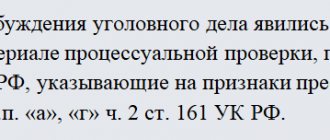A criminal record is a condition of a convicted person that entails criminal legal consequences if a crime is committed again (recidivism), which means its presence can be considered an aggravating circumstance when imposing a punishment, which is why the removal of a criminal record is of such interest to many who come to us with this question.
If you need a criminal lawyer, contact us. If you are currently serving a sentence and need parole, then read the link for more information.
How does expunging a criminal record differ from expunging it?
In accordance with Part 3 of Art. 86 of the Criminal Code of the Russian Federation, the expungement of a criminal record occurs after a certain period of time after the end of the sentence in the case of a real imprisonment. For crimes of minor or moderate gravity it is 3 years, for serious crimes - 8 years, and for especially serious crimes - 10 years. If a suspended sentence is imposed, the end of this period coincides with the end of the probationary period. If the punishment is not related to imprisonment, the criminal record is closed one year after the end of its execution. Its repayment in these cases occurs automatically.
The expungement of a criminal record, in contrast to its expungement, is not carried out automatically, but by a court decision (Part 5 of Article 86 of the Criminal Code of the Russian Federation). This happens based on the results of consideration of the application of the interested person. A criminal record is subject to early expungement if 2 conditions are met:
- Impeccable behavior of the convicted person after serving the sentence is completed. This means that he no longer committed any offenses (including administrative violations).
- The harm caused as a result of the commission of an unlawful act is compensated to the victim in full.
It should be noted that it can also be removed due to an amnesty or in connection with the pardon of a convicted person.
If a citizen has committed more than one crime, the issue of expunging a criminal record is considered separately in relation to each of them.
Possible reasons
The expungement of a criminal record in Russia can also occur through an amnesty or pardon. Amnesty is a criminal normative act that is adopted by the State Duma in relation to a certain category of persons.
Important! A pardon consists of a decision by the president regarding a specific citizen. This concept is disclosed in legal acts and is considered an effective method for expunging a criminal record in some cases.
The difference between the two concepts:
- amnesty is under the jurisdiction of the State Duma, pardon is carried out by the head of the country;
- pardon is associated with the initiative of the convicted citizen, since it requires his petition, but amnesty does not;
- a pardon concerns one person, an amnesty affects a specific category of persons.
When using the method of release and expungement of a criminal record using a pardon, you need to draw up a petition to which you can attach papers related to the case. It is registered with the authority, its duration should not exceed 20 days.
Within 20 days, the application must reach the Ministry of Justice of the given region; this body, no later than a week, submits it to the commission and transmits the information to the Federal Penitentiary Service. This service contacts the Presidential Administration once a month and submits information about applications.
The administration of the head of state provides this information to the President at least once every quarter. The Administration or the President may request additional documents on the case from the authorities of the relevant region. From the date of receipt of the request, local services have 10 days to respond.
When a petition is rejected, the citizen is notified of this, he can send it several times, the time that must pass is one year. If a positive decision has been made, then a Presidential Decree is prepared and announced after that, within up to two days it is sent to the highest official of the region from where the petition was received, the Ministry of Internal Affairs, etc.
Russian laws provide for such a procedure; in Belarus, Kazakhstan, Ukraine, and Uzbekistan, different rules apply. They may differ at various points; to find out their rules, you need to familiarize yourself with the laws in force there.
What deadlines must be met to go to court?
The Criminal Code of the Russian Federation defines only the deadlines for automatic expungement of a criminal record.
They depend on the severity of the crime and the punishment imposed. The legislation does not say anything about how long after a criminal record can be expunged at the request of a citizen ahead of schedule. However, from Part 5 of Art. 86 of the Criminal Code of the Russian Federation it follows that a convicted person can count on the satisfaction of a submitted petition if he has proven by his behavior that he has reformed. The fact of correction can be certified only after some time has passed after the execution or serving of the sentence.
Obviously, the length of the period of correction of a convicted person depends on the severity of the act he committed. As a rule, the court accommodates the applicant if, at the time of filing the petition, at least half of the term of the criminal record provided for its expungement has expired.
So this means that:
- with a suspended sentence of a citizen, ½ of the probationary period was left behind;
- if the convicted person was not sentenced to imprisonment, six months have elapsed from the day the punishment was carried out;
- one and a half years have passed since the completion of the sentence for an act of minor or moderate gravity;
- 4 years have passed since serving a sentence for a serious crime;
- at least 5 years have passed since the end of punishment for a crime recognized as particularly serious.
In certain situations, taking into account the personality characteristics of the convicted person, the nature of his crime and data on his behavior, the court may remove a citizen’s criminal record earlier than the deadlines specified here.
Concept and meaning
A conviction in itself is a clear natural consequence of criminal liability.
The possibility of applying punishment to a citizen with a criminal record is indicated in Part 1 of Art. 45 of the Criminal Code of the Russian Federation.
https://www.youtube.com/watch?v=ytadvertiseru
In addition, it is assumed that a criminal record entails a restriction of freedoms and rights in relation to the punitive potential of the specified punishment, as an option, a probationary legal regime.
A criminal record can also be expressed in the likelihood of other legal consequences provided for by criminal liability.
Requirements for filing a petition to expunge a criminal record
The petition is submitted to the court in writing. At the top of the document in the right half of the page the following information should be indicated (listing order is from top to bottom):
- full name of the court or full name justice of the peace and court precinct number;
- the address where the courthouse is located;
- FULL NAME. the citizen from whom the petition comes;
- the address where the applicant lives;
- citizen’s telephone number, fax and e-mail address (if available);
- Case no.
If a lawyer acts in the interests of the interested party, after the citizen’s contact details you should indicate information about him:
- Lawyer's license number;
- No. of the order to execute the order;
- which legal organization issued this order;
- contact information of the lawyer (address, telephone number, fax, e-mail).
Below in the center of the paper is the name of the document - Petition to expunge a criminal record.
Next comes the content part, located on paper as regular text. This should reflect the essence of the petition to be considered in court. In this part of the document it is necessary to provide the following information:
- the date on which the verdict in a criminal case occurs;
- which court made the decision;
- information concerning the defendant (his full name and date of birth);
- under what article of the Criminal Code of the Russian Federation the accused was convicted;
- the type and amount of punishment imposed in accordance with the sentence;
- information about the impeccable behavior of the convicted person, about making amends for the damage caused through his fault, as well as a list of documentation confirming these facts;
- indicate that the petition is being submitted on the basis of Part 5 of Art. 86 of the Criminal Code of the Russian Federation and Art. 400 Code of Criminal Procedure of the Russian Federation;
- then the word “Please” is written in the center of the page;
- then you need to formulate what the request consists of (you need to indicate that you need to remove your criminal record before the expiration date, and also completely bring your full name in accordance with your passport).
Below is an appendix containing a list of documents submitted to the court (including information about a lawyer’s license and information about a warrant for the execution of an order).
Next, the date of filing the petition is indicated, under which is the signature of the citizen (or his lawyer) and its transcript.
How to remove a criminal record: step-by-step instructions
Since expungement by definition implies the early termination of a criminal record, it does not occur “automatically.” The procedure stipulates that the interested person applies to the court, which makes an appropriate decision. The main condition is exemplary behavior of a citizen, which is confirmed by documentary facts.
Step 1. Going to court: collecting documents and other evidence
To begin the procedure, a citizen must contact a criminal justice of the peace or a district court. Both authorities must correspond to the place of residence, i.e. official address of permanent or temporary registration. The main task of the convicted person is to prepare for the hearing, which must be carried out especially carefully. The fact is that if a negative decision is made, a new application is possible only after 12 months.
To prevent this from happening, you need to collect as much evidence as possible that characterizes the applicant on the positive side:
- Characteristics from work.
- A certificate from the district police officer, which indicates that during the designated period the citizen behaved exemplarily and did not commit any offenses.
- Certificate from the Ministry of Internal Affairs confirming the absence of prosecution (both administrative and criminal).
- Financial and other documents that confirm compensation for harm, relevant testimony of the victim.
- Testimony from persons who have the opportunity to frequently observe the applicant’s life. These are neighbors, colleagues, close people.
Among other documents you will definitely need:
- passport;
- court verdict (for a previously committed crime);
- a certificate from the colony confirming full or partial completion of the sentence - it is often called a certificate of release.
Step 2. Writing a petition: sample
The main document that is submitted to the court is the petition. It is compiled in any form. The structure of the document is standard - it contains the following sections:
- “Cap”, which indicates the name of the authority or the full name of the magistrate, as well as the full name, address and contact information of the applicant.
- Document's name.
- Description of the situation - when and on what basis the citizen was convicted, details of the sentence, date of release. Particular attention is paid to the description of the grounds that, from the applicant’s point of view, give him the right to early termination of his criminal record.
- The pleading part is the actual request for withdrawal.
- Attachments – a list of documents that are attached to the application (listed above).
- Date, signature, signature description (last name, initials).
Step 3. Making a court decision: what to do in case of refusal
A positive decision means early termination of a criminal record, a negative decision means rejection of the application. In this case, it is impossible to appeal the decision, so the citizen has only one option - to appeal to the same authority (or to another in case of moving) after 1 year
In what order is the application considered?
In accordance with Art. 400 of the Code of Criminal Procedure of the Russian Federation, a petition filed by a convicted person or his lawyer must be considered by a court or magistrate in the area where the citizen lives. He himself must necessarily take part in a meeting at which the issue of early expungement of his criminal record will be decided. If the citizen fails to appear in court, the court hearing is subject to cancellation.
A person interested in having his criminal record expunged must independently take care of collecting the necessary evidence. They usually use documents such as:
- duly certified copies of court verdicts, decisions, rulings, including those adopted at the stage of appeal, cassation or in the course of supervision;
- certificates confirming that the sentences imposed on the convicted person have been served or executed;
- copies of orders on the application of incentive measures from the place of work;
- characteristics issued by the organization or educational institution in which the citizen is employed or undergoing training;
- papers confirming that the damage caused by the crime has been compensated;
- a certificate from the Ministry of Internal Affairs confirming a criminal record and administrative liability;
- a certificate of the citizen’s behavior at the place of residence, obtained from the district police officer.
If there are no documents required for an objective consideration of the application, the court has the right to request them independently.
The prosecutor is notified of the receipt of the petition. He is also entitled to take part in the hearing, but the court can consider the application of the convicted person without his participation.
The hearing begins with the court, after a brief report on the merits of the case, giving the floor to the citizen who filed the petition. He can give his explanations on the essence of the issue under consideration. Then the judges begin to examine the presented materials, provide the opportunity for the prosecutor (if present) and other persons who have received an invitation to the trial to speak.
If the decision is not made in favor of the applicant, he will have the opportunity to re-file the application on the same grounds only one year from the date on which the decision to refuse was adopted. But it can be challenged on appeal.
Example
So, S.V. by the verdict of the Volgograd Garrison Court he was convicted of abuse of power and fraud under Part 1 and Clause “c” of Part 3 of Art. 286 of the Criminal Code of the Russian Federation, as well as under Part 3 of Art. 119 of the Criminal Code of the Russian Federation. He received 3.5 years in a penal colony and was stripped of the rank of major general. Then the Presidium of the North Caucasus District Military Court reviewed the case, recognizing S.V. guilty only under paragraph “c” of Part 3 of Art. 119 of the Criminal Code of the Russian Federation. The term of imprisonment was reduced to 3 years and 3 months. A few months later, the place where the sentence was served was changed to a colony-settlement. Soon S.V. was released on parole. The unserved term was 1 year 8 months.
After the end of the probationary period, more than ½ of the period had passed before the expiration date of the criminal record, he filed a petition for its early removal. S.V. received a refusal, against which he filed an appeal. He referred to the fact that the court's decision was not motivated. In particular, it was not taken into account that S.V. compensated for the damage caused, got a job at a search and rescue station in a leadership position and personally saved 7 people. The court had no evidence that the citizen’s behavior could not be considered impeccable. As a result, the decision made by the previous instance was canceled, and the petition of S.V. – satisfied (appeal ruling of the Moscow City Court dated September 17, 2022).
Consequences
There are many consequences of a criminal record:
Citizens with a criminal record cannot perform certain labor functions.- A criminal record does not allow one to obtain or restore Russian citizenship.
- A person turns out to be limited in the right to vote, as well as to be elected.
- Access to state secrets for persons with a criminal record is limited.
The fact that a person has a criminal record must be reported when filling out certain official papers.
If a person has a criminal record, then some restrictions on his constitutional rights may be imposed on him.
We are talking about the right to choose a place of residence and freedom of residence.
Features of expunging a criminal record in the case of decriminalization of an act
Decriminalization of an act means that it has ceased to be considered a crime and no longer poses a public danger, and therefore it was excluded from the Criminal Code of the Russian Federation. This circumstance must be taken into account by the court. If the proceedings are already underway, they must be terminated, since there is no corpus delicti in such a situation. Simultaneously with the refusal to prosecute a citizen, the court removes his criminal record.
In cases where the convicted person has already served his sentence for a decriminalized act, there is no need to file a petition with the court. Expungement of a criminal record will occur automatically on the day when the amendments made to the Criminal Code of the Russian Federation come into effect.
But it is worth considering that after a criminal record is cleared based on the decriminalization of a criminal article, a citizen will still be considered a former convict. Information that he previously had a criminal record will continue to be stored in the databases of the Ministry of Internal Affairs. A review of a sentence in accordance with the position of the Supreme Court of the Russian Federation can be carried out only before the expiration of the criminal record or its removal.
Differences
How does expungement of a criminal record differ from expungement?
These legal procedures differ for the following reasons:
- Expungement of a criminal record occurs automatically as a result of the end of the sentence established by the court for an offense committed by a citizen.
For repayment to occur, a citizen does not need to take any measures or submit any documents to law enforcement agencies. The expungement of a criminal record is a special procedure for early change of the terms during which the legal consequences of a committed offense apply. A criminal record is cleared only after certain procedures are carried out in the form of filing a petition in court, issuing a pardon or an amnesty. - Repayment is allowed only after the expiration of deadlines strictly regulated by law. Withdrawal can be made after the expiration of 50% of the period allotted for repayment, but this setting is based on generally accepted judicial practice and is not enshrined in law.
Both repayment and withdrawal allow a citizen to completely get rid of the legal consequences of the offense he committed. In both cases, the criminal record is annulled.
Legal status of a citizen after the removal of a criminal record
If a criminal record is cleared, it is considered that the citizen was not brought to criminal liability. This means restoring his civil rights. If a person commits a new crime, it will be considered as committed for the first time. A relapse in such a situation cannot be taken into account.
However, information about previous convictions does not disappear from the Ministry of Internal Affairs database and, in cases provided for by law, can be requested by authorized persons. Some restrictions imposed on a citizen will remain with him for life. Thus, he will not be able to join the police or prosecutor’s office, or get a job in an educational or children’s institution. This circumstance is also an obstacle to the adoption of a child. Judicial practice also testifies to this.
Example
A young pediatrician, after graduating from a medical academy, was denied employment based on the provisions of Art. 351.1 of the Labor Code of the Russian Federation, which imposes restrictions on work involving interaction with minors. It turned out that during the training period he was sentenced to a suspended sentence under Part 2 of Art. 228 of the Criminal Code of the Russian Federation (illegal possession of psychotropic drugs on a large scale).
The citizen did not agree with this decision and filed a lawsuit to cancel it. The statement of claim stated that the applicant was found guilty more than 3 years ago. At this time, he was studying in an internship and was not engaged in professional activities. The citizen was released early from the restrictions associated with punishment. Also, by court decision, his criminal record was expunged. The act did not entail any socially dangerous consequences. Among other things, the plaintiff referred to Part 3 of Art. 351.1 of the Labor Code of the Russian Federation, according to which a person with a previous criminal record may be allowed to work with children if the commission for minors gives permission. But he failed to win the case. A subsequent appeal also left the court decision unchanged (appeal ruling of the St. Petersburg City Court dated June 3, 2015 No. 33-8594/2015).
Who practically tried and what happened.
In judicial practice there are a lot of cases that ended in the refusal of the applicant to satisfy his demands.
Example 1. Case No. 2-1406/2011. Citizen Yagodkina I.I. appealed to the court with a request to remove information regarding her from the database. In her statement, she indicated that the prosecution for the act she committed was terminated, although she never received the prosecutor's order. The court, having studied the case materials, came to the conclusion that it was impossible to remove information from the GIAC, since the parties did not deny the fact of committing a crime. The court explained that termination of proceedings on non-exonerating grounds is not a reason to destroy data from the system.
Example 2. Case No. 2-4962/2013. Citizen Miller N.V. appealed to the court with a demand to remove information about him from the GIAC of the Russian Federation because he considers the storage of information discrediting him illegal. From the case materials it is obvious that the applicant was convicted, served his sentence, and had his conviction expunged. The court refused to satisfy the applicant's demands, indicating in the decision that the information entered the database legally, so its exclusion was not provided for.
Other examples can be given.
Next, we will consider the court decisions taken in favor of the applicants.
Example 1. Case No. 2-7330/2011 ~ M-7113/2011. Semenov N.P. It was possible to prove that information about the crime he allegedly committed got into the database by accident; a criminal case was never opened against him. Since the materials had already been destroyed, and the police confirmed the fact that no case had been opened, the court ordered the authorized body to delete information about N.P. Semenov. from GIAC RF.
Example 2. Case No. 2-604/2011 ~ M-267/2011. Shamsutdinov N.R. won the argument because he proved that he knew nothing about the fact that an investigation was being carried out against him. Since the case materials were destroyed and cannot be restored, the court decided to satisfy the requirements to remove information from the GIAC of the Russian Federation.
Example 3. Case No. 33-2621/2011. Sheremetyev V.M. committed a crime that ended in the reconciliation of the parties in a private prosecution case. The applicant asked the court to remove information about the crime from the database, since the proceedings ended on exonerating grounds. The court satisfied the demands of V.M. Sheremetyev. Information about him was indeed subject to removal from the database.
Thus, it will only be possible to remove information from the RF GIAC database if it is located there illegally.
Job
There are a number of restrictions on working in some organizations.
It is impossible to get into the service of law enforcement, judicial, executive bodies, or work in government civil positions.
It is believed that a criminal record can bar access to many interesting professions:
You cannot engage in teaching or advocacy activities.- For persons with a criminal record, it is problematic to get into service in the military forces of the Russian Federation.
- Citizens with a criminal record cannot get to high positions in some financial institutions.
In order to understand what difficulties a person with a criminal record may encounter when applying for a job, you should look at the Labor Code.
In cases where there is no direct ban, and a person with a criminal record is not hired for a certain position, it is possible to achieve this through the court.
Will they take you into the army?
Young people of conscription age who have served sentences in prison often have the question: “Are they accepted into the army with a criminal record?”
To understand this issue, you need to refer to Article 23 of the Law on Military Service.
It is impossible to enlist in the army only if the criminal record has not been expunged or expunged.
If the criminal record has already been cleared or automatically expunged, no problems should arise with service in the armed forces of the Russian Federation.
What evidence and documents should I attach to the application?
Remember that when considering a petition to expunge a criminal record, the magistrate may request certain documents necessary to consider the convicted person's application. It is in the interests of the applicant to collect such a volume of documents that would provide grounds for a positive court decision. The package of such documents must include:
- court sentence;
- certificate of completion of sentence;
- receipts proving compensation for damage caused by the applicant during the crime;
- a positive reference from the place of new work or study;
Additionally, it makes sense to attach to the application:
- medical certificates, if the reason for the application is a deteriorating health condition;
- information from the district police officer or the criminal-executive inspectorate;
- characteristics from neighbors and work colleagues, characteristics from the place of study;
- copies of the marriage certificate and birth certificate, if after serving the sentence the convicted person started a family and had a child.
We invite you to read: Who has the right to a maternal pardon, or the President of the Russian Federation?
Scheme and time of submission
Let us move on to highlight the issue of timing and procedure for submitting the petition under consideration. The main condition for the time interval here is the passage of half of the period established by law after the applicant’s release. Unspent punishment or unserved conviction automatically revokes this right for the perpetrator of the crime.
However, compliance with this rule is a sufficient basis for such a request. As for the order of consideration of the case, things are as follows:
- filing a petition;
- a court decision to begin the process, for which 10 days are allotted;
- consideration of the case on its merits or refusal to proceed.
Reasons for rejecting a petition, in addition to failure to comply with the required period, include incorrect execution of the petition or lack of information in the papers on the reasons for the sentencing . In addition, the court has the right to refuse to consider a request if speech patterns of an offensive nature or disrespect are detected.
Important ! The trial procedure involves statements by the applicant and a representative of the prosecutor's office, hearing witnesses and analyzing the evidence presented to the court of the correction of a particular citizen guilty of a crime.
A positive verdict means the admissibility of rehabilitation of a convicted person from the moment the relevant decision enters into legal force. If the court does not find sufficient grounds to satisfy such a request, the applicant receives another year to collect the necessary papers and evidence of repentance.
It will not be possible to resubmit your application before this deadline. As for the actual practice of considering such cases, over 70% of requests remain unsatisfied. The reason for this outcome is the moral character of the criminals and insufficient repentance for the violation committed.









